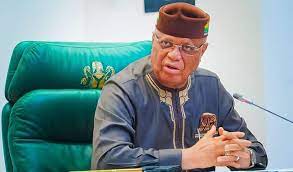SUNDAY March 30, 2025 |
By thenewsdesk.ng
By Etim ETIM
I grew up in Uyo in the 1970s. Then it was a small, rustic town with bicycle as the dominant mode of public transportation. Even then, the bicycles were few in number, and so people routinely walked from place to place around town. I walked to the library on Udo Otung Ubo Street; walked to church on Paul Bassey St (off Oron Road) and walked all over the town to visit friends. The bicycles were very few and the roads were scanty. In the 1980s, motor cycles gradually replaced bicycles as the dominant means of public transportation. By then I had gone off to the university and was surprised to see so many motor cycles each time I returned home for holidays. But a few bicycle-taxis still managed to operate. Cross River State was mocked for being the only state in the country to have motor cycles as taxis. It was such a big deal that NTA actually featured it in its magazine programme, Newsline. We were the butt of jokes all over the place. But by the time I left for NYSC in the mid 1980s, motorcycle-taxis have become commonplace all over the country. We Cross Riverians were then teasing the rest of the country for imitating us without paying royalty.
In 2011, the Akpabio administration outlawed the use of motor cycles as taxis in Uyo because of their complicity in criminal activities. Like many, I welcomed the ban because the cyclists were becoming a big menace. Apart from their involvement in crime, they were reckless on the road, causing so many accidents, injuries and deaths. I had expected that the ban of the cyclists would lead to the emergence motor vehicle taxis in Uyo. It didn’t. Instead, tricycles began to make appearance on the roads, and after some years, minibuses came on the scene. Uyo roads are now full of tricycles and minibuses, while motorists struggle for space. The town has changed over the years from what it was in the ‘70s, ‘80s and ‘90s, but municipal transportation still remains chaotic and unorganized.
You can therefore imagine my excitement when I read this week that the state government is working on setting up a standard bus service that would eventually replace tricycles and minibuses. It would be the second state government-managed city bus service in the country. Lagos State was the first to introduce it in the 1990s, while FCT floated something in the early 2000, but it was poorly managed and short-lived.
A modern township bus service for Uyo is long overdue. With a good road network, the town deserves better. I was curious to understand how it would work, so I made some inquiries and found out that Orman Esin, former commissioner for transport, who now serves as Gov. Eno’s Delivery Advisor on Transportation, is the man to talk to. I got him on phone. The scheme will take off in the last quarter of this year with 10 CNG-powered air-conditioned buses in the first phase. Each bus should carry up to 30 passengers, but the routes are yet to be determined. The government is currently constructing a CNG plant and workshop in Itam, along Calabar highway, where the buses would be fueled and maintained. It will also attend to other motorists who may want to convert their petrol engines to CNG and provides maintenance and repair services for all CNG vehicles.
From 10 township buses, the operation will steadily scale up to serve other LGAs. Esin spoke passionately, stressing that the CNG vehicles will reduce carbon emissions and pollution; enhance public transportation and accessibility within Uyo and the target LGAs; drive economic growth and create jobs. Passengers would use rechargeable smart cards with unique IDs to pay fares digitally, thus eliminating cash transactions. Think of the Oyster Cards used for payments for London buses and trains! Tickets would also be purchased on the bus; at stations, online or via mobile apps. If this works out as planned, Akwa Ibom would become the first state to operate a digitalized township bus service, just as we are the first and only state to own an airline and an MRO.
I understand that the government has already commissioned a comprehensive feasibility study on the project and the report is that this would be a lucrative business if well managed. I commend the government for the initiative which would further give the town a more modern outlook and feel. While the government is still putting finishing touches to the project, I will like to suggest that before the scheme takes off, bus stops should be constructed on dedicated routes. The dedicated routes, in my view, are Airport, Aka, Abak, Ikot Ekpene and the ring roads. Bus stops should be about 250 meters apart – the standard measurements in congested areas of many cities.
God bless Akwa Ibom State.
Related posts
Categories
- Advertisements (1)
- Agriculture (45)
- Breaking News (26)
- Business (598)
- Crime (987)
- Education (319)
- Entertainment (128)
- Features (13)
- For The Records (43)
- Foreign News (1,186)
- Health (219)
- Home News (332)
- Interview (9)
- Judiciary (348)
- Lifestyle (140)
- Local News (111)
- National News (1,447)
- Opinion (26)
- Politics (1,005)
- Religion (157)
- Science and Technology (125)
- Security (680)
- Sports (878)
- States' News (816)
- Transportation (327)
- Uncategorized (10)

